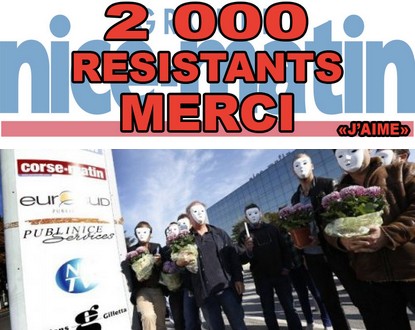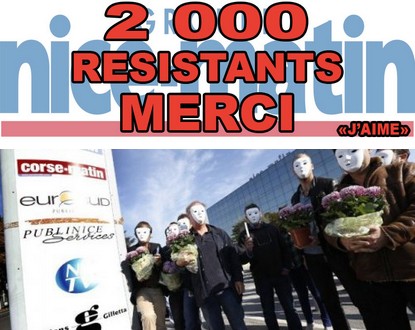Reading the union’s statement about the current state of negotiations with the owners for the restructuring of the Nice-Matin group makes it clear that the situation is on the brink of collapse.
 Facing the remission of employees who are ready to find a solution to avoid a layoff plan that resembles a real bloodbath, there are only “no” responses from the property representatives. Arrogance is mistaken for strength when threatening with the blackmail of bankruptcy.
Facing the remission of employees who are ready to find a solution to avoid a layoff plan that resembles a real bloodbath, there are only “no” responses from the property representatives. Arrogance is mistaken for strength when threatening with the blackmail of bankruptcy.
In reality, the goal is obvious: to beautify the company with a nice makeover of the accounts (a technique known in banking as Window Dressing) to present it to investors who, as the name suggests, won’t put money into a business with the certainty of losing it. Normally, it’s quite the opposite.
The truth, and indeed the problem, arises from the fact that the ownership wants the employees to foot the bill for this makeover. This is known as the privatization of profits and the socialization of losses. A nice formula, unfortunately applied all too often these days! But let’s set morality aside; it’s like giving pearls to swine.
One can understand the employees who, for quite some time now, have been living with this feeling of constant uncertainty. But when the future is dark, light can shine through, despair can turn into courage, and necessity can give rise to new, innovative ideas. Logic dictates that to know where you’re going, you should always know where you come from.
If a newspaper is an indispensable tool for the proper functioning of democracy, if this democracy risks being deprived of its right to information, then why not react as responsible citizens and envision a collective adventure with long-term commitment?
Why not jump over the hurdle instead of vainly trying to circumvent it, the current employees at the forefront, and propose to the ownership, for whom the newspaper is just a product and numbers, an alternative solution? How, you ask? Nothing is impossible…
Why not, for example, establish an SCIC, which is a cooperative company* where employees, customers, beneficiaries, financiers, but also local communities could become partners, potentially financing openly instead of doing so, as they currently do, through the abundant contributions in the form of advertising?
All these cooperators make up the general assembly. They participate in the company’s direction decisions, notably the election of managers, the approval of accounts, and the allocation of results.
This multi-stakeholder approach wouldn’t prevent managing the group with as much economic efficiency (perhaps even with a reorganization if needed, but with the aim of revamping the group and not just cutting costs like heads) with independent management and for the general interest.
Simple? No, quite the contrary; very complicated, because the first obstacle will be the current ownership. One could even bet that this activity, which today wouldn’t hold up financially, suddenly becomes a valued asset? “Per aspera ad astra” (said the Latins), nothing is easy if you want to escape the deadlock and the alternative will be to lose as little as possible!
But maybe this humble proposal (which other more competent people can refine and make compatible with the situation at hand) deserves consideration if we want to avoid the impending collapse at the horizon facing a property with no moral compass.
Besides, past and present facts stand and speak louder than a thousand words. Already in 1904, the famous economist and father of modern sociology Max Weber called for Sozialokonomische Wirstschaft (Social Economy).
These socio-economic initiatives, regardless of their names, are part of a new political economy that acknowledges the significance of the social in economic matters, making civil society initiatives visible and legitimate, and more recently, reflecting citizens’ demand for a more responsible economy.
In this regard, social economy is increasingly recognized, not only for itself but also for its potential to transform society and the economy, notably through its capacity to materialize change and a new form of ownership.
For those who doubt, let us remind them of the film “Mutiny on the Bounty,” where the placid botanist responds to the (evil) captain, who is surprised to see him among the mutineers, asking, “You too?” The answer: “With someone like you, one has no choice.”
Granted, that was just a movie script, but…



